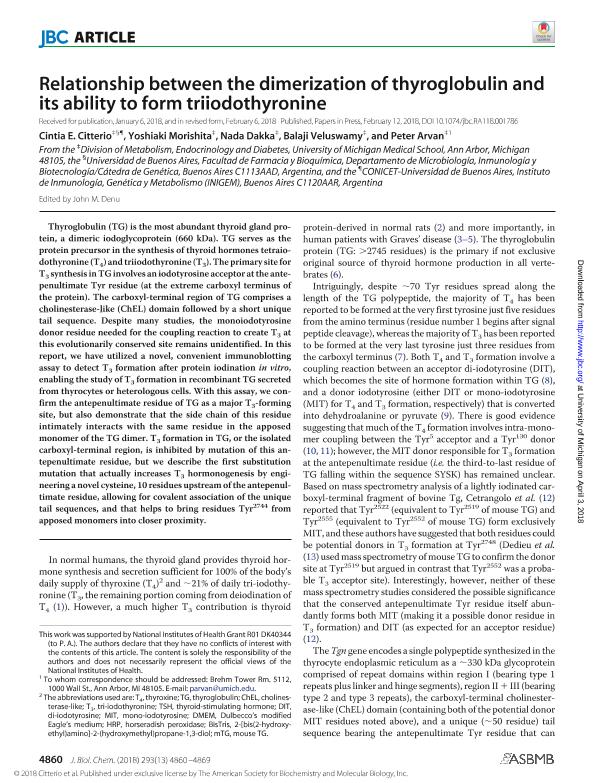Artículo
Relationship between the dimerization of thyroglobulin and its ability to form triiodothyronine
Fecha de publicación:
03/2018
Editorial:
American Society for Biochemistry and Molecular Biology
Revista:
Journal of Biological Chemistry (online)
ISSN:
0021-9258
Idioma:
Inglés
Tipo de recurso:
Artículo publicado
Clasificación temática:
Resumen
Thyroglobulin (TG) is the most abundant thyroid gland protein, a dimeric iodoglycoprotein (660 kDa). TG serves as the protein precursor in the synthesis of thyroid hormones tetraio-dothyronine (T 4 ) and triiodothyronine (T 3 ). The primary site for T 3 synthesis in TG involves an iodotyrosine acceptor at the antepenultimate Tyr residue (at the extreme carboxyl terminus of the protein). The carboxyl-terminal region of TG comprises a cholinesterase-like (ChEL) domain followed by a short unique tail sequence. Despite many studies, the monoiodotyrosine donor residue needed for the coupling reaction to create T 3 at this evolutionarily conserved site remains unidentified. In this report, we have utilized a novel, convenient immunoblotting assay to detect T 3 formation after protein iodination in vitro, enabling the study of T 3 formation in recombinant TG secreted from thyrocytes or heterologous cells. With this assay, we confirm the antepenultimate residue of TG as a major T 3 -forming site, but also demonstrate that the side chain of this residue intimately interacts with the same residue in the apposed monomer of the TG dimer. T 3 formation in TG, or the isolated carboxyl-terminal region, is inhibited by mutation of this antepenultimate residue, but we describe the first substitution mutation that actually increases T 3 hormonogenesis by engineering a novel cysteine, 10 residues upstream of the antepenultimate residue, allowing for covalent association of the unique tail sequences, and that helps to bring residues Tyr 2744 from apposed monomers into closer proximity.
Palabras clave:
IODINATION
,
THYROGLOBULIN
,
CHOLINESTERASE
,
MUTAGENESIS
Archivos asociados
Licencia
Identificadores
Colecciones
Articulos(INIGEM)
Articulos de INSTITUTO DE INMUNOLOGIA, GENETICA Y METABOLISMO
Articulos de INSTITUTO DE INMUNOLOGIA, GENETICA Y METABOLISMO
Citación
Citterio, Cintia Eliana; Morishita, Yoshiaki; Dakka, Nada; Veluswamy, Balaji; Arvan, Peter; Relationship between the dimerization of thyroglobulin and its ability to form triiodothyronine; American Society for Biochemistry and Molecular Biology; Journal of Biological Chemistry (online); 293; 13; 3-2018; 4860-4869
Compartir
Altmétricas




